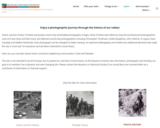
This resource offers an overview of Cybercrime.
- Subject:
- Business and Communication
- Material Type:
- Homework/Assignment
- Lesson
- Reading
- Provider:
- Michigan Virtual
- Date Added:
- 04/27/2022

This resource offers an overview of Cybercrime.
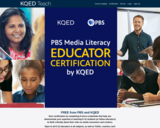
Open to all K-12 educators in all subjects, as well as ToSAs, coaches, tech coordinators, media specialists and librarians. Earn certification by completing 8 micro-credentials that help you demonstrate your expertise in teaching K-12 students (or fellow educators) to think critically about their roles as media consumers and creators.

This video is part of the Learn and Grow with WHRO TV series. Watch Alystra Barefoot teach about story elements.
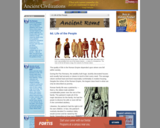
During the Pax Romana, the wealthy built huge, lavishly decorated houses and usually had servants or slaves to tend to their every need. The average citizen worked hard and lived reasonably comfortably in modest housing. Despite the riches of the Roman Empire, the largest class lived in what can only be described as poverty.

Objectives:
To create a professional Senior Leadership ePortfolio
To collaborate and discuss what makes a successful portfolio
To peer review portfolios using mindful and effective feedback
Essential Question:
What makes a successful portfolio?
What can I do to make my portfolio successful and professional?

In this lesson, students analyze model programs and a model Directors' Note to understand the format of these texts. They read the model Directors' Note for gist and use it to begin planning their monologue group's Directors' Note as part of the module performance task (RI.5.4, W.5.2, W.5.4, W.5.8, SL.5.1, L.5.4).
Consider that some students may be able to rely on background knowledge about plays and theater when discussing the programs and Directors' Notes. Spend extra time contextualizing these concepts if necessary. Display photographs or brief videos of plays and directors working with actors. Also consider inviting students to share experiences with plays and theater in their home languages and cultures.
The Opening of this lesson is designed for students to use internet sources as texts. If the technology necessary for students to complete the reading is unavailable, provide them with a printed copy of the texts.
In the Closing, students generate criteria for reading fluency on the Fluent Readers Do These Things anchor chart in preparation for Part III of the End of Unit 3 assessment and performing their monologues as part of the module performance task (RF.5.4).
This lesson focuses on the following habits of character: working to contribute to a better world and working to become effective learners. The characteristics that students are reminded of in this lesson are: apply my learning when discussing the module performance task and perseverance before reading the model Directors' Note.
Students practice their fluency in this lesson by following along and reading silently as the teacher reads the model Directors' Note in Work Time A and by developing criteria for fluent reading in the Closing.
The research reading that students complete for homework will help build both their vocabulary and knowledge pertaining to human rights. By participating in this volume of reading over a span of time, students will develop a wide base of knowledge about the world and the words that help describe and make sense of it.

In this lesson, students use their research from Lessons 8-9 to write a draft of their Directors' Note with their monologue group (W.5.2, W.5.4, W.5.5, W.5.8).
In Work Time B, students are guided through a research reading share. Consider using the Independent Reading: Sample Plan if you do not have your own independent reading review routines. This review is designed to hold students accountable for their research reading completed for homework. This volume of reading promotes students' growing ability to read a variety of literary and informational texts independently and proficiently (RI.5.10, RL.5.10, SL.5.1).
This lesson focuses on the following habits of character: working to become effective learners and working to become ethical people. The characteristics students are reminded of in this lesson are: collaboration, as they work with their groups to write their Directors' Note, and taking initiative, prior to sharing their independent reading.
In the Closing, students practice reading their monologues in preparation for Part III of the End of Unit 3 Assessment and the performance task (RF.5.4).
The research reading that students complete for homework will help build both their vocabulary and knowledge pertaining to human rights. By participating in this volume of reading over a span of time, students will develop a wide base of knowledge about the world and the words that help describe and make sense of it.

In this lesson, students continue to research and gather evidence for their monologue group's Directors' Note. They research issues related to human rights, select a right that their issue fits under, and learn about how the issue impacts people today (W.5.2, W.5.8). Specific examples of current issues have not been provided in this lesson, as situations can change very quickly. To ensure the content students are researching is up-to-date, websites that describe current threats to human rights have been suggested and will need to be reviewed in advance to identify the issues and the specific web pages that align with the threats to human rights students have highlighted in their monologues (see Technology and Multimedia).
This lesson is designed for students to use internet sources as texts. If the technology necessary for students to complete the reading is unavailable, consider providing them with a printed copy of the texts.
At the end of the lesson, students practice reading their monologues in preparation for Part III of the End of Unit 3 Assessment and the performance task (RF.5.4).
This lesson focuses on the following habits of character: working to become ethical people and working to become effective learners. The characteristics that students are reminded of in this lesson are: respect when sharing ideas during a whole class discussion and perseverance before reading internet research.
The research reading that students complete for homework will help build both their vocabulary and knowledge pertaining to human rights. By participating in this volume of reading over a span of time, students will develop a wide base of knowledge about the world and the words that help describe and make sense of it.
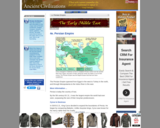
Rather than destroy local economies for their own selfish gain, the Persians worked to increase trade throughout their kingdom. They standardized weights, developed official coinage, and implemented universal laws.

Teaching the features of persuasive marketing and writing.

An adaptable writing frame for teacher to comments; self evaluation and an indicator of whether the work was independent, shared or teacher assisted etc.
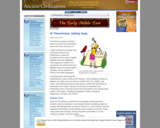
The Phoenicians lived along the Mediterranean coast in what is now Lebanon. They inhabited a number of different city-states, the most famous of which were Tyre, Byblos, and Sidon. These Phoenician places were often in conflict with each other for domination of the region. Because of this lack of cooperation, the Phoenicians were conquered and forced to pay tribute to the virtually every empire in the region, including the Egyptians, Hittites, Assyrians, Babylonians, Persians, and Greeks.

For these lessons, students will be taken through a variety of activities to learn about plagiarism. They will learn what plagiarism is, the consequence for it, how to paraphrase writing, when to use direct quotes, and how to cite. This is a wonderful webquest for students to go through.

These lessons address science, math, and ELA standards. We have a Tower Garden and these lessons focus on parts of plants, plant needs for growth, and comparing differences between plants growing in soil and an Aeroponic gardening system. Students will monitor and graph growth.
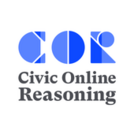
This lesson provides students with the opportunity to continue practicing click restraint, a strategy that involves resisting the urge to immediately click on a result and instead scanning the page to make a more informed choice about where to click first. In this lesson, students learn how to analyze the search engine results page in order to make hypotheses about the kinds of sources and information generated in response to the search terms.
This lesson serves as an extension to the Click Restraint lesson. We suggest you teach that lesson before this one.

This unit is designed to accompany the study of George Orwell's Animal Farm. Resources encourage students to recognize a variety of propaganda techniques and to connect those techniques to media that they can find in their everyday lives. Resources also help students to understand the historical uses of propaganda by governments and political parties to influence public opinion. Resources can be used independently of the novel.
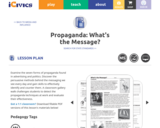
Examine the seven forms of propaganda found in advertising and politics. Discover the persuasive methods behind the messaging we see every day and gain skills to effectively identify and counter them. A classroom gallery walk challenges students to detect the propaganda techniques at work and evaluate their effectiveness.

First grade students will be immersed in three different public service announcements. This immersion will help them understand the characteristics of a PSA. After a discussion, the students will create one on either internet safety or being a good digital citizen.

A framework for a new and stronger national government had been crafted at the Philadelphia Convention by a handful of leaders. But how could their proposed system be made into law?

In this lesson, students consider the unit research question and develop specific categories for research. Then, in small groups, students read texts about how kids have made a difference and take notes using those categories (RI.4.1, W.4.7, W.4.8).
W.4.8 requires students to gather information from print and digital sources. As such, this lesson is designed for students to use internet sources as texts. If the technology necessary for students to complete the reading is unavailable, give them printed copies of possible texts from which to choose. Note that "Protecting Our Planet" is not a website and is provided (see supporting materials).
Students who finish quickly or require an extension can use a search engine to find their own sources.
In this lesson, students focus on working to become effective learners by focusing on a characteristic of their choice as they work in expert groups to begin their research.